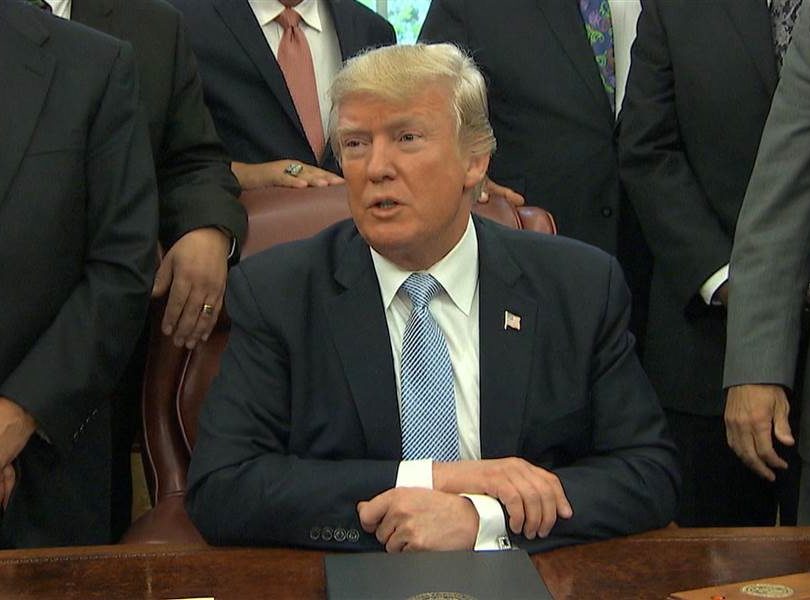President Trump’s DACA Decision
October 1, 2017
Although President Trump’s first 8 months in office have certainly been filled with a large variety of controversies over policies of all types, his decision to repeal the Obama-Era immigration policy called DACA (Deferred Action for Childhood Arrivals) last week has provoked some of the fiercest political arguments thus far.
This policy has been in place since June 2012 when President Obama and the Department of Homeland Security issued a memorandum, which allowed minors who had illegally crossed into the United States in past years to avoid deportation for 2 years, at which time they could become eligible to obtain a work permit to remain in the country.
The main reasons for the repeal of DACA are rooted in the opposition of President Trump, Attorney General Jeff Sessions, and other Cabinet officials to increased levels of immigration to the US, saying they often deny jobs to Americans.
At the time of its creation in 2012, this order was criticized by many conservatives for being what they perceive as a vast overreach of executive privilege, stating that is the right of Congress, not the President, to make changes to existing immigration laws. There have also been numerous concerns that allowing 800,000 people who are in the country illegally could set a precedent that many other illegal immigrants who cross the border could become citizens if they remain in the country for a given period of time.
It has been said that this could jeopardize American national security at a time when fears of terrorism have reached such high levels. Although controversial, the President’s decision is not unexpected. He frequently voiced his staunch opposition to President Obama’s immigration programs, and promised to repeal DACA immediately after taking office, although debates within his administration ultimately delayed this decision for several months.
On the other hand, supporters of DACA argue that the US has a responsibility as the world’s leader to accept those who came into the country with their parents or unaccompanied as minors, and that it is not fair to punish people for decisions they played no role in making.
There has also been a focus on the violence and gang warfare that has gripped many of the areas in Central and Southern America that immigrants to the US are coming from. Critics of the President’s DACA decision say that it is cruel and inhumane to send immigrants back to these crime-ravaged and highly dangerous areas, where innocent civilians are often the victims of horrible crimes, extortion, and intimidation.
Overall, public opinion of President Trump’s elimination of DACA is split. Polls conducted by Politico and CNN show that a majority of Americans support keeping DACA, although large majorities also supporting increased border security and action by Congress to keep the program in return.
Those opposed to the President’s announcement have not hesitated to make their opinions known, staging large and numerous protests in cities across the country, including Washington D.C., Chicago, and Los Angeles. There was also well-attended protests outside of the White House and Trump Tower, featuring large crowds displaying their belief that the President’s decision was mean-spirited.
This split public opinion was further complicated by President Trump’s decision to discuss a possible salvage of DACA by the Congress with Congressional Democratic leaders.
Following a meeting attended by Congressional leaders of the Democratic and Republican parties in the Oval Office, Democratic Senator Chuck Schumer (D-NY) and Congresswoman Nancy Pelosi (D-CA) announced that a tentative deal had been reached with the President and other Republicans to allowing those involved in the DACA program to remain in the country indefinitely, and that this deal would include additional border security funding, though excluding the President’s long promised border wall.
President Trump has since said, however, that any deal on DACA will require Congressional approval of funding for a border wall to be built along the US southern border, along with additional technological upgrades for border security. This new development, however, has caused some discontent amongst longtime and loyal Trump supporters, who oppose his decisions to possibly compromise on this key issue he often highlighted during his campaign.
At the moment, any conclusion to this political struggle would certainly appear to be far off. Both sides are deeply committed to what they believe is the correct, most reasonable path for our country going forward.
Additionally, countless aspects must be weighed going forward in order to reach a coherent and reasonable American policy on illegal immigrants residing in the US. Ranging from protecting the national security of the US to caring for disadvantaged migrants, the necessities and concerns that will need to be taken into account in order to finally resolve this complicated matter are immense, and it is certainly guaranteed that debate over what course our country will take on this matter will be one of the most important debates in our nation during the coming years.


